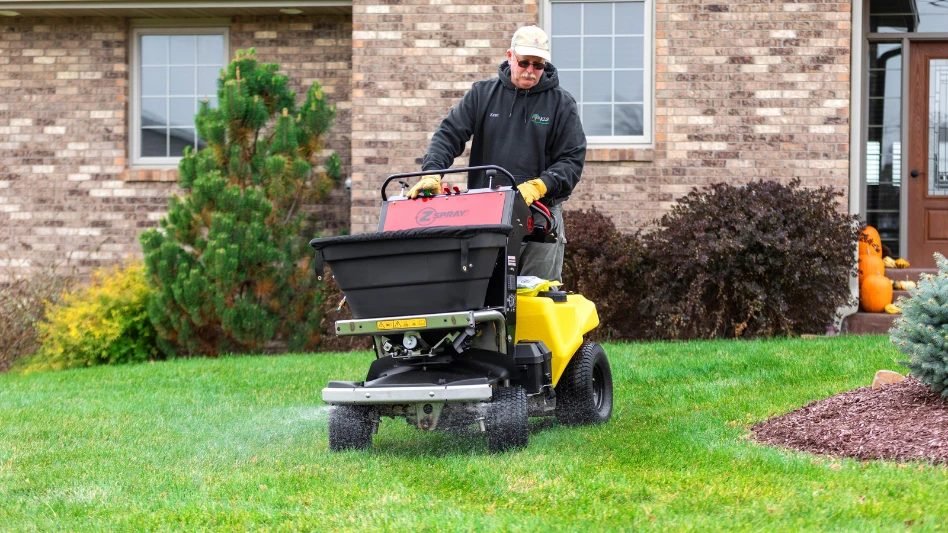
 Rain, rain, go away – or at least don’t stick around the entire day. That’s what landscapers are thinking in spring when grass grows faster, weeds need control and the landscape is preparing to burst into full bloom.
Rain, rain, go away – or at least don’t stick around the entire day. That’s what landscapers are thinking in spring when grass grows faster, weeds need control and the landscape is preparing to burst into full bloom.
Spring start-up is a delicate scheduling time. Since you can’t control Mother Nature, you might as well make the most of rainy days. Lawn & Landscape spoke with three contractors to find out how they turn a weather wash-out into a win.
On the radar
A spring week with four days of rain is par for the course in Nova Scotia, where Graham Oldreive operates Ducke’s Lawn Care Services in the town of Dartmouth. “April and May can make or break you because of the weather,” he says. “You are stuck with weather – you can’t do much about it but work around it.”
 And Oldreive has plenty of work to do when it rains. Mainly he focuses on marketing. He took advantage of this winter’s snow storms to revamp his website and build in a live Twitter feed.
And Oldreive has plenty of work to do when it rains. Mainly he focuses on marketing. He took advantage of this winter’s snow storms to revamp his website and build in a live Twitter feed.
So, when it rains this spring, he can post weather and routing updates via Twitter and customers can find out in real-time how far he is running behind schedule.
Oldreive advertises his website, Twitter feed and Facebook page on flyers he circulates to clients and prospects. He also includes this information on his business cards and post cards.
“If I’m postponed because of a rain delay, they can see that I’m two hours behind because of rain,” he says. “This helps customers keep abreast of my schedule.”
But not all customers can keep up via Twitter – mainly the senior citizen population Oldreive serves. So he makes phone calls if he’s running behind. When rain washes out his service plans, he works late on nice days or extends his work into the weekends. Most customers don’t mind if you’re mowing on Sundays, he says.
 Depending on how wet the weather is, Oldreive may still stick to his outdoor work. “I can still mow in light rain – though if grass is wet you have to bag it,” he says. “It’s not recommended, but if you are under pressure … .”
Depending on how wet the weather is, Oldreive may still stick to his outdoor work. “I can still mow in light rain – though if grass is wet you have to bag it,” he says. “It’s not recommended, but if you are under pressure … .”
Weeding, on the other hand, is an ideal rain-day activity. “The ground is soft and weeds come out easier,” Oldreive says. “And, there are edging jobs that can be done in the rain, even though they tend to get mucky. It can be done.”
Most rain days, Oldreive spends the time managing shop tasks and handling paperwork. “There is always equipment to fix and blades to clean,” says Oldreive, who does most of his own maintenance. His most productive rain day was spent rebuilding a lawn mower with a bum motor.
“To get a full day during the summertime to do that is near impossible,” he says, adding that a rain day can be a blessing in the heat of summer when equipment needs attention.
Meanwhile, Oldreive also spends rain days advancing his education through online training sessions. He might learn about a new piece of equipment. And, there’s always the never-ending paper trail to tame and new sales to generate.
“Last year, I spent a ton of time marketing – I was out networking and visiting customers and potential customers, putting out flyers and business cards – getting my name out there,” Oldreive says.
 Overtime showers
Overtime showers
If you don’t like the weather, wait an hour and it will change. That’s what they say in Florida where Keith O’Neil says the tropical climate brings daily afternoon rain showers during summer. The sun’s shining one minute, and the next a downpour causes crews to pull over and take cover.
The good news is, most of the time, the strong showers don’t last even a half an hour. So crews can hide out in covered trailers (the reason why the company chose this type). And thanks to sandy soil that soaks up water quickly, crews get back to work quickly.
Sure, jobs take more time immediately following a rain. “It makes blowing off the sidewalks a little more difficult, but we can still mow,” says O’Neil, senior estimator at Florida Landscape Professionals in Winter Garden. And in areas by retention ponds where the soil is especially soggy, crews might use a weed eater to cut down swaths of grass.
Not unless the rain is constantly off-and-on will O’Neil call crews in. And then, he makes the decision quickly – he keeps a weather radar active up on his desktop computer – so he doesn’t waste valuable man-hours.
“In the maintenance business, overtime is the first thing that will kill you,” O’Neil says. And chalking up hours back at the shop when there’s still work on the books to complete in the field can push the clock past 40 hours. O’Neil doesn’t want this to happen, so he’s careful about keeping crews on during rain, even for training or fix-ups at the shop.
“Our jobs are not priced for overtime,” O’Neil says, figuring that a job has to bring in three times what he pays a worker to afford the cost of overtime. That means he needs to get $30 per hour from a client to pay a $10 per-hour worker overtime. “That’s tough to do in this market.”
To avoid this, crews work four 10-hour days. Friday is reserved for making up work. This comes in handy if there are a couple half-days missed because of rain earlier in the week. O’Neil knows he hasn’t “spent” his 40 hours per employee yet because he sends them home, and he can call them in on Friday to make up time. The company stays on schedule, and customers don’t have landscape crews on their properties during the weekend.
In fall and winter, grass is cut less frequently. So when there is a rain day, O’Neil can often afford to bring crews back into the shop to help with projects without spending more than the 40 hours per worker, per week limit. He keeps a project board with priority items and stocks materials to complete those tasks. That way, he can quickly assign crews to a job – such as replacing floor boards in a trailer – and they can get to work without delay.
“The key is to have a plan for rain days,” O’Neil says. “Have a strategy of what you’ll do during the downtime, and how you’ll do it.”

 Scheduling flexibility
Scheduling flexibility
Travis White is tuned in to the National Weather Service on an hourly basis, especially in the spring.
“I spend a lot of time watching that website and that helps us make adjustments to our work schedule,” says White, president of Hyde Park, Utah-based Specialized Pest Control & Lawn.
Located in a small mountain valley, storms can rush in and bring rain to one side of the mountain while the other side stays dry.
“Weather creates tension and stress in this business,” White says. Timing is especially sensitive the first two and a half months of the season when starting up clients’ annual lawn care schedules.
“Most of the time we can rebound if we get off schedule, but if we do have a month where the weather is being difficult, it can really throw us off,” White says. And that’s especially true if rain washes out valuable work days in May.
“That is when we do most of our weed control,” White says, relating that these products really shouldn’t be applied in rain.
“You can end up with a domino effect where you’re behind in May and then all the way through June. You can usually rebound in July and get back on track.”
 White builds some flexibility into the schedule in spring by giving customers a two-day service window – say Thursday or Friday. This helps set realistic client expectations.
White builds some flexibility into the schedule in spring by giving customers a two-day service window – say Thursday or Friday. This helps set realistic client expectations.
“And if we can’t hit that window, we will make a phone call,” White says.
Rain doesn’t always keep White and crews out of the field. For one, the company can still aerate lawns. And if it isn’t raining too hard, fertilizer can be put down. It has to be watered in anyway.
Also, the company provides interior pest control for residential and commercial clients, so those services are not affected by what the Doppler forecast brings.
In addition, there’s plenty of work to be done in the shop on rainy days: truck cleaning, equipment maintenance and safety training.
And if these items are all checked off – and that’s usually not the case – White will call it a day (off).
“Some of our guys don’t mind that – they welcome the break, especially during the first few months of spring when it’s crazy.”

Explore the May 2013 Issue
Check out more from this issue and find your next story to read.
Latest from Lawn & Landscape
- PERC helps debut propane direct-injection fuel system at ACT Expo 2025
- Retargeting Ads – A Secret Weapon for Growing Your Lawn Care Business
- Leading a growing company
- Project EverGreen launches Clean Air Calculator
- Rain Bird acquires smart lawn care company OtO from Toronto
- PBI-Gordon names Marvin as VP of research and development
- Mean Green rolls out Vanquish Autonomous mower
- Focal Pointe launches new podcast series





